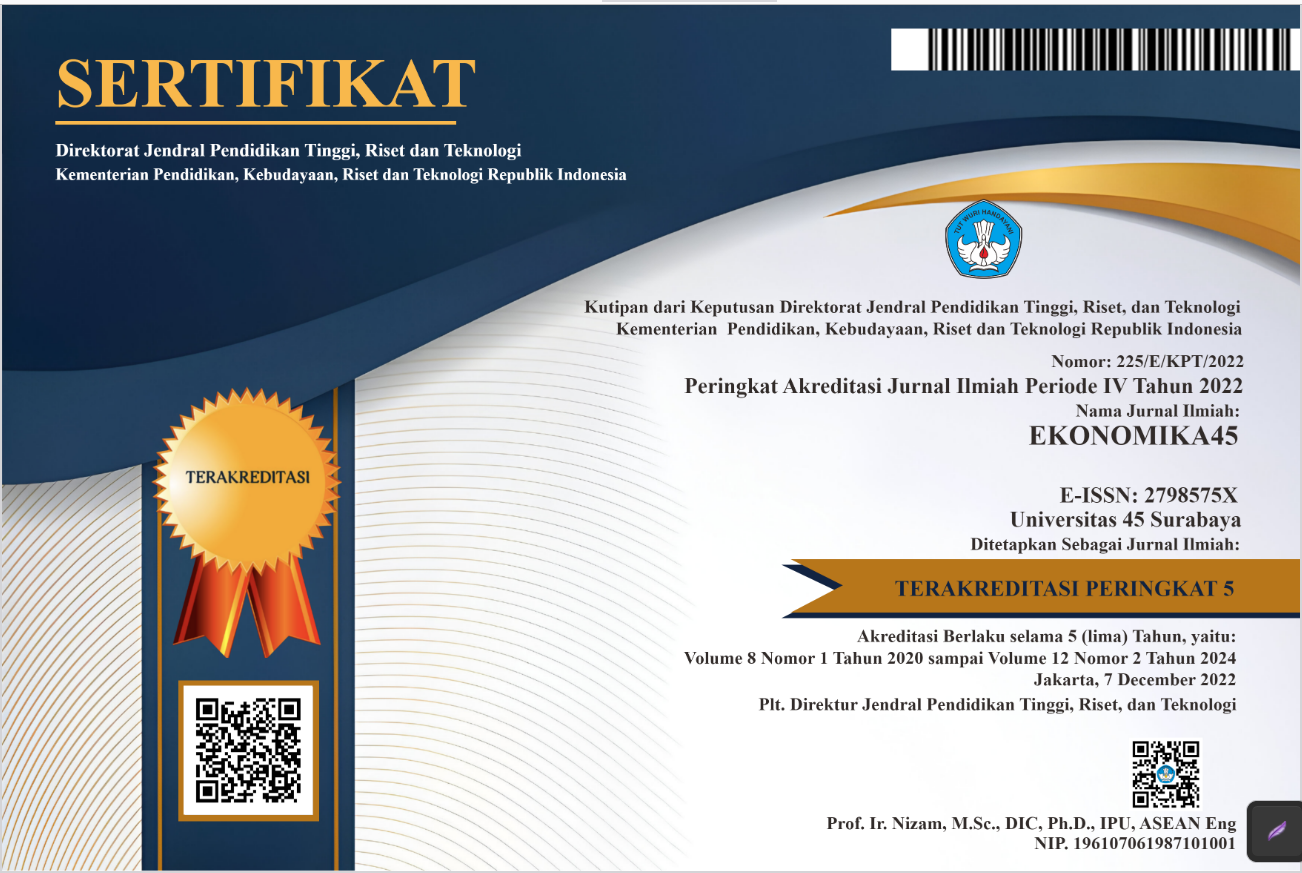Pengaruh Self-Improvement dan Self-Determination terhadap Employee Engagement
DOI:
https://doi.org/10.30640/ekonomika45.v11i2.2801Keywords:
Employee engagement, self-improvement, self-determination, eneration ZAbstract
Employee engagement, also known as employee engagement, is very important for creating a productive work environment and producing high-quality employees. Generation Z employees are looking for opportunities to learn and develop professionally. They also look for opportunities to improve their skills and contribute to their organizations. Technology, flexibility, learning and development, meaning, purpose and purpose are all needs of Gen Z. Generation Z knows how important their work is and the benefits it offers. They also like to work together and work together at work. Employees who are engaged in their work emotionally, cognitively, and physically will be more enthusiastic, committed, and integrated. Two factors that influence employee engagement are self-improvement and self-determination. The research results show that self-determination has a greater influence of 55.2 percent on employee engagement compared to self-improvement (37.4 percent). Apart from that, self-determination and self-improvement have a joint influence of 55.3 percent on employee engagement.
References
Albrecht, S. L., Bakker, A. B., Gruman, J. A., Macey, W. H., & Saks, A. M. (2015). Employee engagement, human resource management practices and competitive advantage. Journal of Organizational Effectiveness: People and Performance, 2(1), 7-35.
Aziz Sholeh, Abdul et. Al. 2024. Kompensasi Terhadap Motivasi Kerja Karyawan pada PT. Insolent Raya di Surabaya, Journal Of Management and Creative Business Vol. 2 No. 1 Januari 2024, Halaman : 82 - 96
Bakker, A. B., & Demerouti, E. (2008). Towards a model of work engagement. Career Development International, 13(3), 209-223. https://doi.org/10.1108/13620430810870476
Boyatzis, R. E. (1999). Self-directed change and self-concept change. In R. E. Boyatzis & J. L. Kolb (Eds.), Performance & instructions (pp. 227-242). New Jersey: Prentice Hall.
Chillakuri, B., & Vanka, S. (2022). Understanding Generation Z Expectations for Effectively Attracting, Recruiting, and Retaining this Next Generation of Workers
International Journal of Human Resource Studies, 12(1), 20-41.
Deci, E. L., & Ryan, R. M. (1985). Intrinsic motivation and self-determination in human behavior.
Plenum Press.
Deci, E. L., & Ryan, R. M. (2000). The "what" and "why" of goal pursuits: Human needs and the self-determination of behavior. Psychological Inquiry, 11(4), 227-268. https://doi.org/10.1207/S15327965PLI1104_01
Deci, E. L., Olafsen, A. H., & Ryan, R. M. (2017). Self-determination theory in work organizations: The state of a science. Annual Review of Organizational Psychology and Organizational Behavior, 4, 19-43.Dhanabhakyam, M., & Purushothaman, M. (2020). Self-determination and self-improvement: Drivers of employee engagement among Generation Z. International Journal of Organizational Analysis, 28(5), 1125-1140.
Iorgulescu, M. C. (2016). Generation Z and its perception of work. Cross-Cultural Management Journal, 18(1), 47-54.
Jones, A., Smith, B., & Johnson, C. (2020). “Understanding Employee Engagement among Generation Z Workers.” Journal of Organizational Behavior Studies, 15(2), 45-62.
Joo, B. K., & Lee, I. (2017). Workplace happiness: work engagement, career satisfaction, and subjective well-being. Evidence-based HRM: a Global Forum for Empirical Scholarship, 5(2), 206-221.
Kanfer, R., Frese, M., & Johnson, R. E. (2017). Motivation related to self-regulation: A take on entrepreneurial success. Applied Psychology, 66(3), 541-556. https://doi.org/10.1111/apps.12109
Özçelik, G., & Cenkci, T. (2022). The effect of self-improvement and self-determination on employee engagement among Generation Z employees. International Journal of Contemporary Hospitality Management, 34(1), 342-361.
Ryan, R. M., & Deci, E. L. (2000). Self-determination theory and the facilitation of intrinsic motivation, social development, and well-being. American Psychologist, 55(1), 68-78.
Saks, A. M. (2006). Antecedents and consequences of employee engagement. Journal of Managerial Psychology, 21(7), 600-619. https://doi.org/10.1108/02683940610690169
Schaufeli, W. B., & Bakker, A. B. (2003). Utrecht work engagement scale: Preliminary manual.
Occupational Health Psychology Unit, Utrecht University.
Schaufeli, W. B., & Bakker, A. B. (2004). Job demands, job resources, and their relationship with burnout and engagement: A multi-sample study. Journal of Organizational Behavior, 25(3), 293-315. https://doi.org/10.1002/job.248
Soane, E., Truss, C., Alfes, K., Shantz, A., Rees, C., & Gatenby, M. (2012). Development and application of a new measure of employee engagement: The ISA Engagement Scale. Human Resource Development International, 15(5), 529-547.
Downloads
Published
How to Cite
Issue
Section
License
Copyright (c) 2024 EKONOMIKA45 : Jurnal Ilmiah Manajemen, Ekonomi Bisnis, Kewirausahaan

This work is licensed under a Creative Commons Attribution-ShareAlike 4.0 International License.









